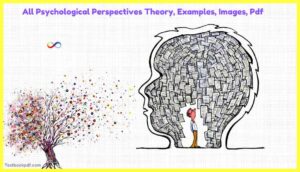All Psychological Perspectives Theory, Examples, Images, Pdf
In this article, we will discuss individual perspectives and the biopsychosocial models with Images. List of All Psychological Perspectives Theory, Examples, Images, Pdf.
Introduction to the Major Perspectives in Psychology
The main objective is to differentiate between the seven perspectives in psychology, we will provide an overview of the seven perspectives and the bio-psychosocial perspective which is an integration of all seven perspectives then we will finish with a set of review questions to check for understanding.
List of All Psychological Perspectives Theory, Examples, Images, Pdf
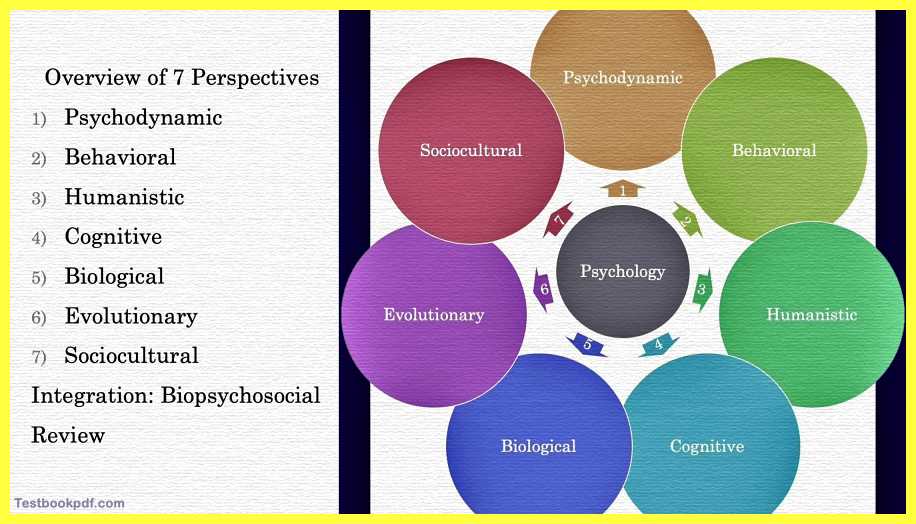
The 7 major perspectives in psychology are:
- Psychodynamic Perspective.
- Behavioral Perspective.
- Humanistic Perspective.
- Cognitive Perspective.
- Biological Perspective.
- Evolutionary Perspective.
- Sociocultural Perspective viewpoints.
We will cover each in order starting with the psychodynamics, So let’s start.
#1. Psychodynamic Perspective in Psychology
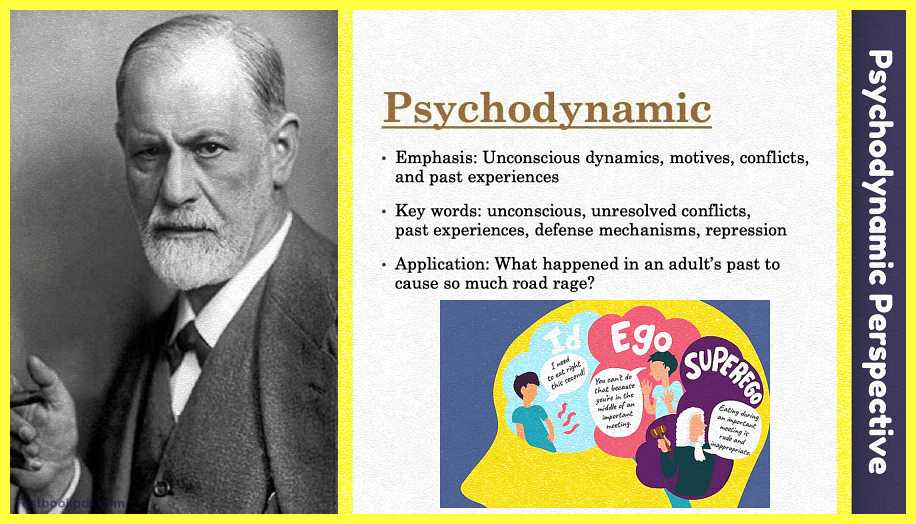
The psychodynamic perspective is one of the earliest in psychology in the early 1900’s Sigmund Freud pictured at the left is credited with founding the psychoanalytic viewpoint which was the precursor to the modern psychoanalysis of the psychodynamic perspective to uncover the unconscious dynamics motives and conflicts in the mind, the word unconscious refers to aspects of our mind that we’re not aware of and they’re often rooted in our early childhood, Freud saw a dream analysis as one way to uncover that latent or hidden meanings from the unconscious, when trying to differentiate the psychodynamic from the other perspectives look for keywords like the unconscious or unresolved conflicts and focused on early or childhood experiences, other words like defense mechanisms and repression also reflect the psychodynamic view, one way to think about the psychodynamic perspective is through road rage.
Have you ever felt intense road rage or witnessed someone else’s and wondered what happened to them may be in their past perhaps their childhood to cause them so much anger and so much rage.
#2. Behavioral Perspective in Psychology
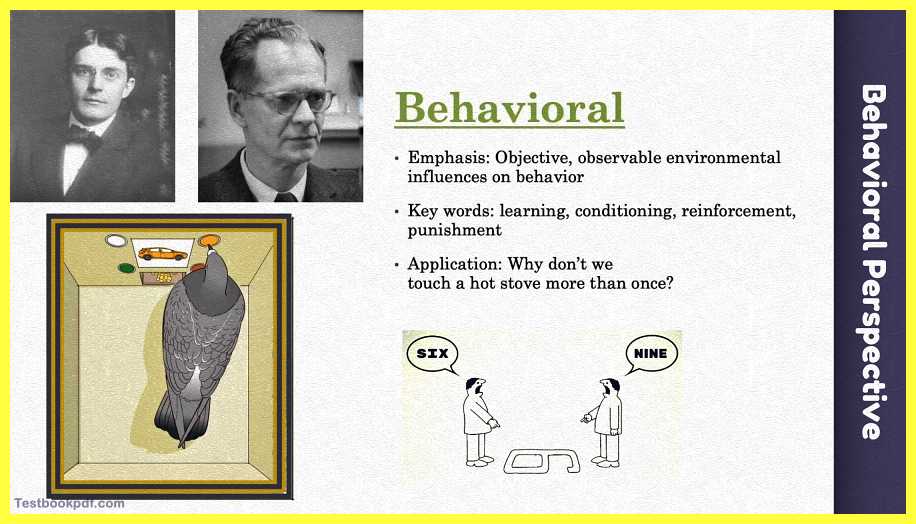
That’s a psychodynamic question the behavioral perspective rejected studying the unobservable unconscious mind of psychoanalytic theory the behavioral perspective is strongly associated with learning early behavioral psychologists like John Watson and BF Skinner both pictured Studied how the environment shapes the objective observable behaviors they thought to make psychology a true science we should only study behavior that we can see and measure they often used animals in their research such as rats and the pigeon.
The crux of the behavioral perspective is how we learn keywords to remember for the behavioral perspective is learning to the condition which is a fancy word for learning reinforcement and Punishment, A simple example of the behavioral perspective shows how quickly we learn from experience, why don’t we touch a hot stove more than once because we learn from experience.
#3. Humanistic Perspective in Psychology
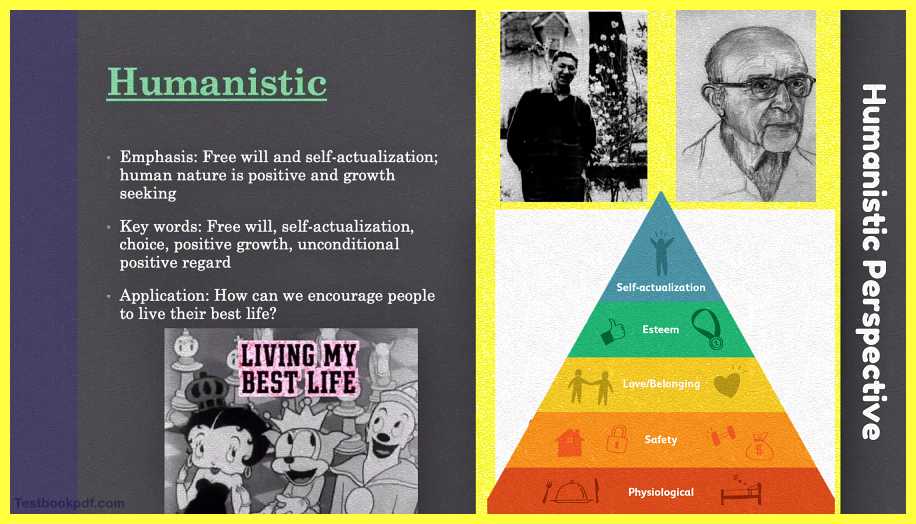
The humanistic perspective sometimes called the third wave in psychology differed from the deterministic views of the psychodynamic and behavioral perspectives whereas psychoanalysts saw humans, as controlled by unconscious early experience, and behaviorists, saw humans as controlled by what they’ve learned from their experiences.
humanists emphasized free will, in the 1960s people like Abraham Maslow and Carl Rogers both pictured at the top right saw human nature as positive and seeking growth or to be the best version of ourselves which Maslow termed self-actualization.
you may be familiar with Maslow’s hierarchy of needs and you’ve seen his pyramid before with self-actualization at the top and the lower needs below it, I found this fake version bottom right with Wi-Fi as the most basic human need keywords to look for in the humanistic perspective are self-actualization freewill choice positive growth and unconditional positive regard which means showing warmth to others without conditions, humanistic psychologists want to encourage people to live their best lives which led to the foundation of positive psychology.
#4. Cognitive Perspective in Psychology
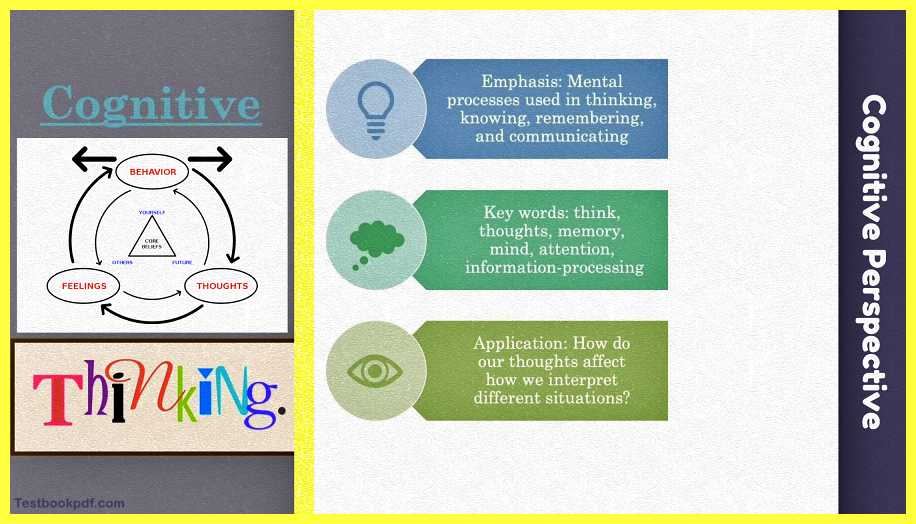
The cognitive perspective takes us back to the mind but with a modern and experimental focus it can be summarized in one word “thinking”.
Cognitive psychologists are interested in the mental processes used in thinking knowing remembering and communicating the big difference between the cognitive and the psychoanalytic view was that the cognitive view is focused on conscious thought whereas behaviorists focused on things you could see as observable Hagar’s cognitive psychology refocuses on the covert or the mind and thinking.
The cognitive perspective uses keywords with versions of the words like think, thoughts, memory, the mind, attention, and information processing, the cognitive perspective often wants to know how our thoughts affect how we interpret different situations.
#5. Biological Perspective in Psychology
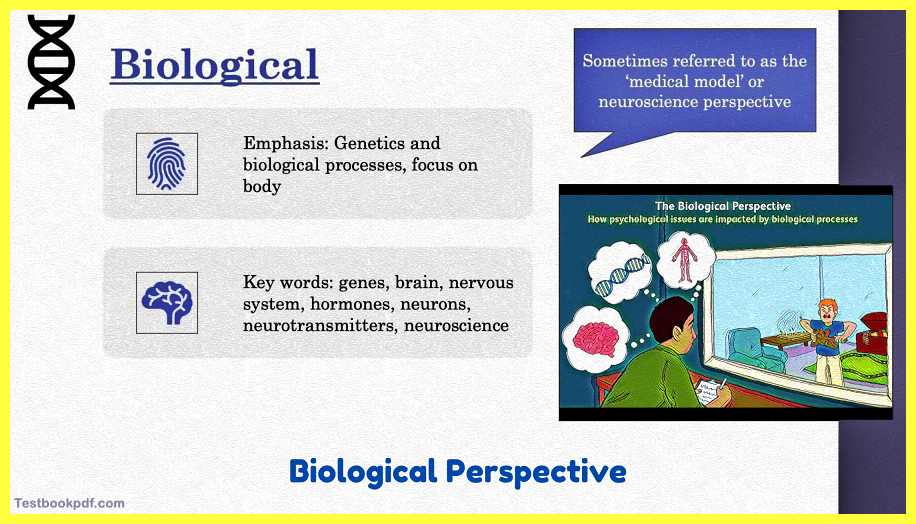
The biological perspective in psychology is sometimes referred to as the medical model when talking about mental illness were considered the neuroscience perspective because of a heavy emphasis on the brain, biological psychologists are interested in the genetics and physical body, especially “the brain”.
They study the brain’s specialized cells or neurons and neurotransmitters other key terms for the biological perspective are genes the nervous system and hormones, one important question for biological psychologists which we’ll cover in the unit on health is, how this chronic stress impaired our immune system, have you ever noticed that you’re the most likely to get sick right around midterms or finals week that’s a contribution from the biological perspective.
#6. Evolutionary Perspective in Psychology
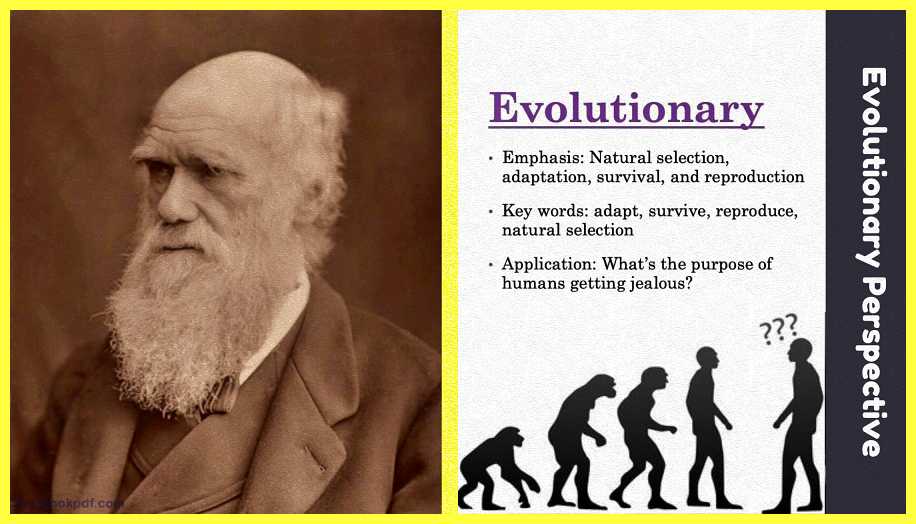
In a similar vein to the biological perspective is the evolutionary view evolutionary psychology is grounded in Charles Darwin’s theory of evolution, the evolutionary perspective often seeks to answer the “why” questions about human thinking and behavior they rely on principles like natural selection and adaptation the roles of survival and reproduction in favoring some ways of thinking and acting over others.
The key words here are versions of the words adapt, survive, reproduce, and natural selection one applied why the question is why do people get jealous, what’s the purpose an evolutionary psychologist would question how jealousy might have been adaptive or useful for our ancestors to help them survive and reproduce, jealousy might function to secure access to a mate or to ward off rivals jealousy is an emotion common across cultures which suggests it might have an evolutionary basis.
#7. Sociocultural Perspective in Psychology
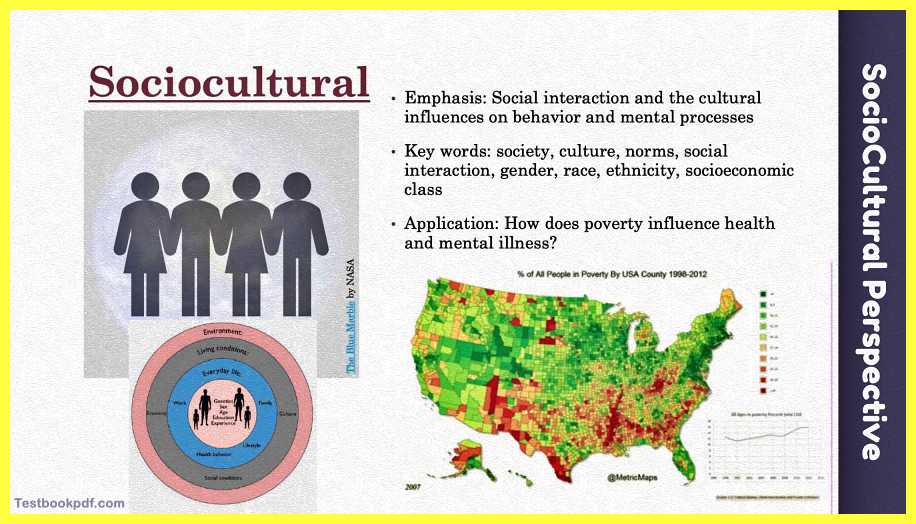
The last unique perspective is the socio-cultural view influenced by sociology the socio-cultural perspective often takes a broader look at human behavior they study, and how social interaction and culture influences behavior and mental processes key words to look for with the socio-cultural perspective are society, culture, norms, social interaction, and social categories like gender, race, ethnicity, socioeconomic class or social class and even religion or occupation, A socio-cultural theorist would be interested in questions like how poverty affects both health and mental illness.
In this given image you can see how the rates of poverty changed in the u.s. from 1998 through 2012 they increased dramatically throughout the south and parts of Appalachia there’s a relationship between these patterns of poverty and health and mental health outcomes.
Integration Bio-Psycho-Social Model
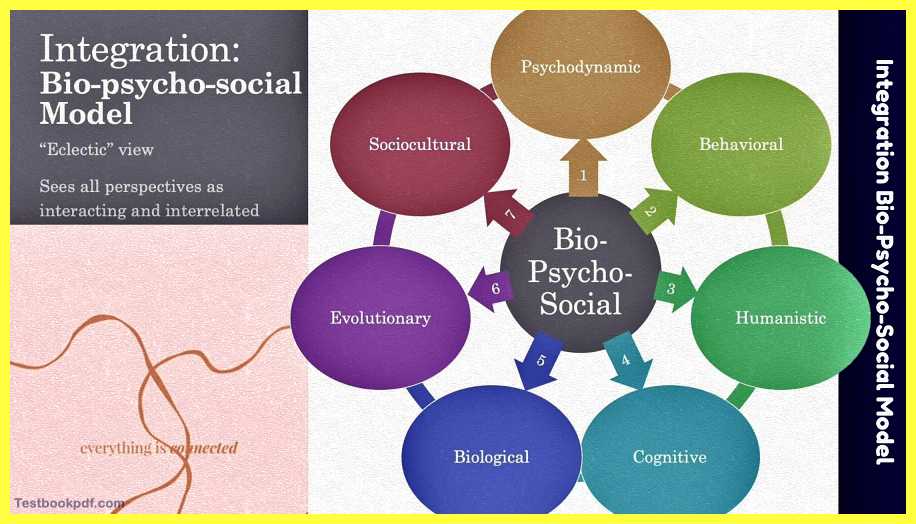
We’ve covered all the unique perspectives and understandably students often ask which one is right well there’s no right or best perspective in the modern view and the one that most psychologists adopt for studying the complexity of human thinking and behavior is the biopsychosocial model which is also called an eclectic view. this model seeks to unify modern psychology by seeing all of the perspectives as interacting and interrelated they see everything as connected.
Psychological Perspective Related Questions and Answers
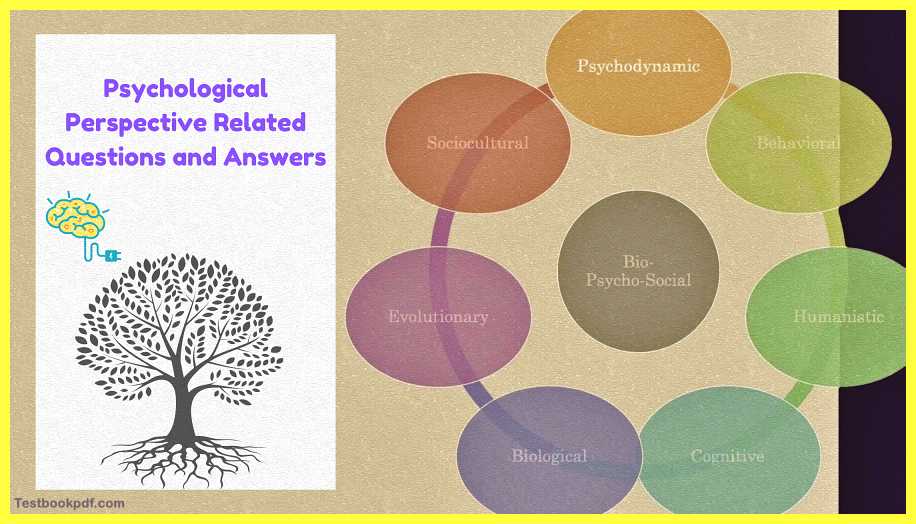
Q- which psychological perspective focused on conscious thought?
A- the cognitive perspective emphasizes thinking and thought processes.
Q- which psychological perspective was interested in how people can achieve their full potential by making positive choices?
A- that’s the humanistic perspective with a focus on positive growth and free will.
Q- which psychological perspective focused on the role of adaptive behavior?
A- that’s Darwin and the evolutionary view.
Q- which psychological perspective would study how genes influence criminal actions?
A- that’s the biological perspective with its focus on genetics.
Q- which psychological perspective focused on the role of the environment in shaping how we learn?
A- that’s the behavioral viewpoint focusing on learning.
Q- which psychological perspective seeks to integrate the approaches to better understand complex thoughts and behaviors?
A- that’s our integrated view of the biopsychosocial model.
Q- which psychological perspective examines unconscious conflicts from early childhood?
A- that’s the psychodynamic view.
Q- which psychological perspective would investigate how social norms influence the amount of eye contact that we consider normal?
A- that would be the socio-cultural view.
Read also:
Company Secretary Kya Hota Hai कंपनी सेक्रेटरी क्या होता है?
Click here for Complete Teaching Study Material – Lets Learn Squad
